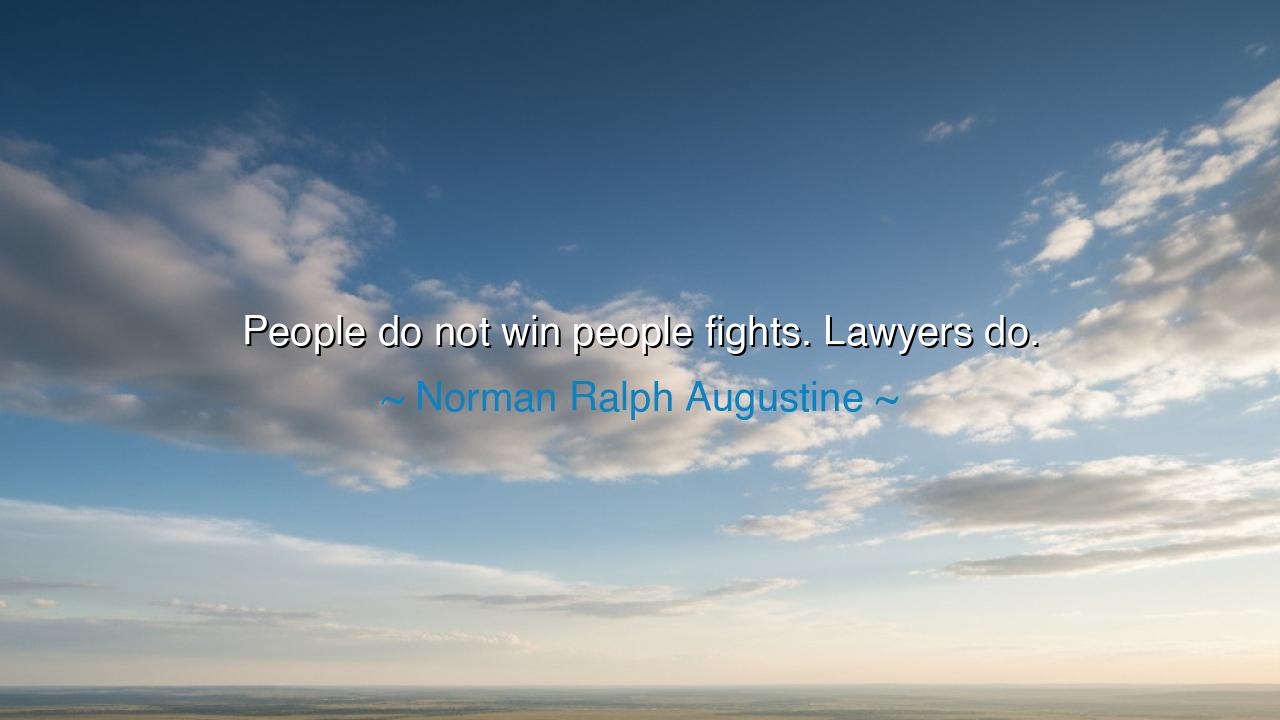
People do not win people fights. Lawyers do.






Hear, O seekers of wisdom, the words of Norman Ralph Augustine, who declared: “People do not win people fights. Lawyers do.” At first, these words may sound harsh, stripping victory from the hands of the people themselves. Yet in truth, they reveal the hidden machinery of power in our world: that disputes, whether between individuals, nations, or mighty corporations, are not resolved by passion alone, but by the wielding of law, of strategy, and of those trained to master the battlefield of words and statutes.
The meaning of this utterance lies in the recognition that fights among people rarely rest on strength or even truth, but upon the ability to persuade, to argue, and to navigate the intricate web of legal systems. The ordinary person, armed only with righteous anger or a sense of justice, may find themselves crushed beneath the weight of procedure and precedent. It is the lawyer, the one who knows the language of courts and the weapons of argument, who steps forth to carry the cause to victory. Thus Augustine reminds us that the fate of disputes often belongs not to the participants, but to those who represent them.
The ancients, too, saw this truth. In Athens, the common man who wished to bring a case before the courts often relied upon logographers, skilled writers who composed speeches for litigants. Without their help, justice could be lost, for the man who spoke poorly was often defeated, even if his cause was just. In Rome, orators like Cicero rose to prominence not because they were always right, but because their mastery of words could sway juries and senates alike. History shows us that fights among people are often decided by those who wield rhetoric and law more skillfully than the disputants themselves.
Consider the example of the Civil Rights Movement in America. Millions marched, sang, and resisted, but the legal triumphs—the desegregation of schools, the Voting Rights Act, the Civil Rights Act—came through the work of lawyers who carried these causes into the courts. Thurgood Marshall, leading the NAACP Legal Defense Fund, argued Brown v. Board of Education before the Supreme Court, striking down the doctrine of “separate but equal.” Without the hand of the lawyer to transform the cries of the people into legal victory, the movement’s progress would have been far slower, perhaps even crushed by the forces arrayed against it.
Yet Augustine’s words are also a warning. If lawyers hold the power to decide the outcomes of people’s fights, then those without access to good counsel are at a grave disadvantage. Justice becomes not only a matter of right and wrong, but of resources—of who can afford the best advocate. History bears grim witness: the poor, the marginalized, the powerless often lose their fights not because they lack truth, but because they lack representation. Thus, his words carry both truth and tragedy: fights belong to lawyers, and therefore to those who can secure them.
The lesson for us is clear: if we would see justice done, we must ensure that access to lawyers—to skilled advocates—is not the privilege of the few but the right of all. To leave the weak defenseless in the courts is to abandon them in their struggles. Support for public defenders, for legal aid, for reforms that make justice accessible—these are the ways a society ensures that “people fights” do not become mere contests of wealth.
Therefore, O listener, take this teaching into your heart. When you find yourself in conflict, do not rely only upon passion or righteousness; seek wisdom, seek counsel, seek those trained in the arts of law. And when you see others without such help, do not stand idly by—lend your voice, your resources, your strength, so that justice may be more than the prize of the privileged.
So let Augustine’s words echo as both truth and charge: “People do not win people fights. Lawyers do.” Remember this, not to despair, but to act wisely. For in a world where battles are fought not with swords but with arguments, it is the guardians of law who decide victories. Let us then strive to make those guardians serve justice, not merely power, so that the fights of the people may at last become victories for the people themselves.






AAdministratorAdministrator
Welcome, honored guests. Please leave a comment, we will respond soon